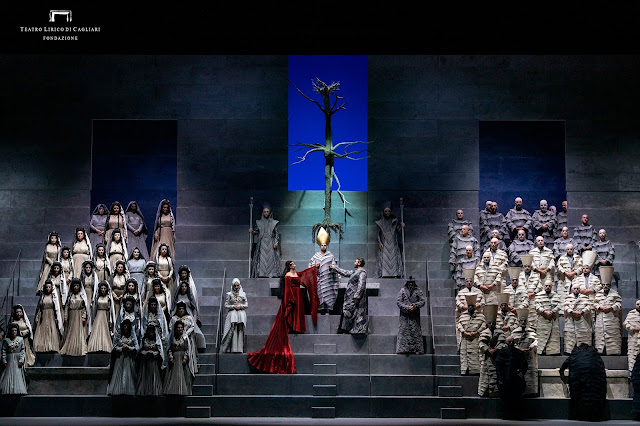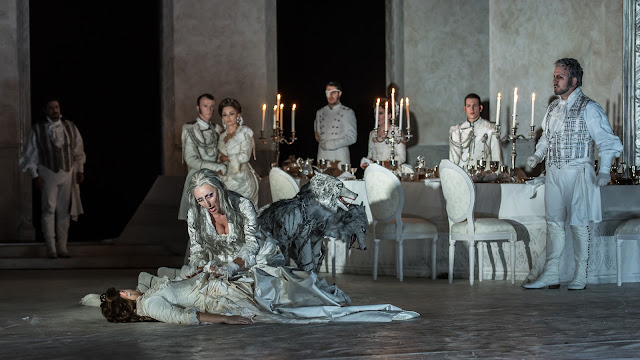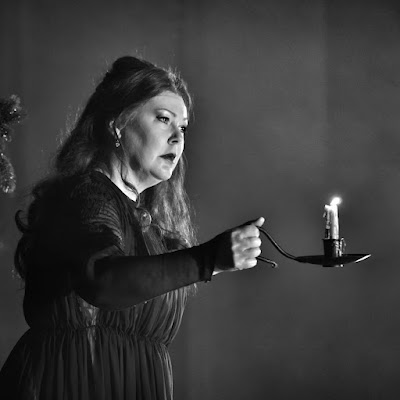%201.jpg) |
| Halevy: La Tempesta - conducted by Francesco Cilluffo at Wexford Festival Opera 2022 (Photo: Clive Barda ArenaPAL) |
Conductor Francesco Cilluffo is the principal guest conductor at Wexford Festival Opera where he conducted Halevy's La Tempesta in 2022 [see my review] and he will conduct Marco Tutino's La Ciociara at Wexford this year in a new production directed by Wexford's artistic director Rosetta Cucchi [see my 2022 interview with her]. In the UK last year, Francesco conducted Opera Holland Park's Delius/Puccini double bill [see my review] and Verdi's Macbeth at the Grange Festival [see my review]
La Ciociara is based on the 1957 book of the same name by the Italian novelist Alberto Moravia, probably best known in the 1960 film adaptation (Two Women) starring Sophia Loren, which was directed by Vittorio de Sica and won Loren an Academy Award for Best Actress, making her the first such winner for a non-English film. Marco Tutino's opera premiered in 2015 at San Francisco Opera with mezzo-soprano Anna Caterina Antonacci, and the European premiere at the Teatro Lirico di Cagliari followed in 2017 in the same production, also with Antonacci. For the Wexford performances, Tutino has produced a new, revised orchestration.
Francesco has a long-standing relationship with Tutino in Italy, working with him for the first time in 2011 on a production of Tutino's opera The Servant (also with Rosetta Cucchi directing). Francesco has conducted more of Tutino's work in Italy including the premieres Le Braci at the Festival della Valle d'Itria in Martina Franca in 2015 and Miseria e Nobiltà at the Teatro Carlo Felice di Genova in 2018, also directed by Rosetta Cucchi. And whilst Francesco has no experience of La Ciociara as a performer, he heard much of the music whilst it was being composed. He also caught the television broadcast of the Italian premiere of the work.
 |
| Francesco Cilluffo |
Unlike most Wexford productions, this work is not strictly a rediscovery but the piece is being re-thought for this new production. In San Francisco, it was written for a large theatre (some 3,000 seats) and so used a huge orchestra. For Wexford, Tutino has reduced these forces somewhat. But also, now the premiere has been done, Francesco sees this as an opportunity to look at the work from a new direction. The original production kept to a single narrative, but in Wexford they plan to explore the work's full aspect, reinterpreting it for today, rather than simply telling the story as it is. Francesco sees the performance of La Ciociara as a nice challenge, rather different from last year when with La Tempesta they revived a work that was not performed for 100 years.
La Ciociara speaks to contemporary audiences on so many levels. Whilst it is about two women's experiences of war, the work is much more universal. It is about the many aspects of war and its impact on those who are not part of the decision-making. Francesco sees it as an Italian opera that speaks to everyone, but there is a particularly strong link to Irish 20th-century history. The leading character is a peasant, and the work follows everything that happens to her in the civil war and the war environment; there is a lot that speaks to an Irish audience.
Francesco has also written operas himself, though he is at pains to point out that it is ten years since he last wrote one. He started out combining conducting and composing but now conducting has taken over. This is one of the reasons that he enjoys working with contemporary composers such as Marco Tutino and Tobias Picker.
Until the early 20th century, composers were conductors both of their own works and of other peoples; it is very much with Arturo Toscanini that things changed. Mahler was known both as a conductor and a composer, but during his lifetime it was as a conductor that he was famous. Mascagni was a fine conductor, both of his own operas and other works, he brought music by Dvorak and Tchaikovsky to Italy including giving the Italian premiere of Dvorak's New World Symphony.
As someone who has written opera, Francesco feels that a composer can be more connected to a contemporary piece, and can understand more. When conducting other composers' works, Francesco does so with the frame of mind of a composer; opera is living matter, so he knows the shape of the piece and the creative process behind it. Also, with operas that are less well-known and not so much masterpieces, you can help get the message across.
 |
| Cilea: Gloria - conductor Francesco Cilluffo -Teatro Lirico di Cagliari (Photo Priamo Tolu) |
He thinks that we should not simply consider rarities as forgotten operas but remember that whilst they are not known now, at the time of their writing they were considered as being at the same level as what are now accepted masterpieces. He recently conducted Cilea's opera Gloria in Cagliari. This premiered at La Scala in 1907 during the same period as Puccini's Tosca (premiered in Rome in 1900), and Madama Butterfly (premiered at La Scala in 1904). All were conceived in the same environment, and seen as being at the same level. At Wexford, they try to see history from the other side, to consider each work from the fresh perspective of when it was first conceived.
With Cilea's Gloria, Francesco feels that there is no reason why the work should not be done more. It is a big Gothic tragedy set in 14th-century Siena. After its first performances, at a time when Richard Strauss' Salome was new (premiered in Dresden in 1905), Gloria was dismissed, but now a public familiar with such sagas as Game of Thrones is far more interested in the Gothic element.
With rarities, the work's performance history has stopped for some reason which may not always be to do with musical issues. In the 1950s, Cilea and his publisher sent the vocal score of Gloria to Maria Callas. Nothing happened, for whatever reason she never replied; but she was interested in Cherubini's Medea, and hence that became well-known again. Similarly, during the 20th century, many works by Jewish composers or on Jewish subjects were simply erased. Also, we have to admit that not all operas that made it to the repertory are masterpieces!
 |
| Catalani: Edmea - conductor Francesco Cilluffo - Wexford Festival Opera 2021 (Photo: Clive Barda ArenaPAL) |
So, a work's lack of performance may not be to do with the quality of the music. But Francesco admits that you cannot completely judge until all the different elements come together on stage. And he points to the example of Leonard Bernstein's White House cantata, 1900 Pennsylvania Avenue which Bernstein commented was a masterpiece when it went into rehearsal and then once on stage, it was not!
Sometimes, you give the work your best shot but you can see where the difficulty lies. It might not be strictly the music, for instance at the moment there are a wealth of Rossini singers but the sort of dramatic voices needed for Verismo are far rarer. This can make operas written during the Verismo period, like Cilea's Gloria, become harder to cast nowadays.
Whilst a history of culture is through the masterpieces, the background material is important. Performing these lesser-known and neglected works is a way of understanding the context that was around the productions of well-known operas. For instance, Catalani's La Wally (premiered at La Scala in 1892) is the better opera, but his Edmea (premiered at La Scala in 1886), which Francesco conducted at Wexford in 2021, gives us more context. Edmea is very much a halfway work, before Catalani was Verdi and after him was the generation of Italian composers who looked abroad for their influences. Francesco found it interesting and inspiring to see the work's mechanism and process. Whilst certainly not as smooth as Puccini, performing Edmea helps us to understand and see these processes more, and enriches our experience of Puccini.
 |
| Mascagni: Guglielmo Ratcliff - conductor Francesco Cilluffo - Wexford Festival Opera 2015 (Photo: Clive Barda ArenaPAL) |
Francesco's relationship with Wexford started in 2015 when he conducted Mascagni's early opera, Guglielmo Ratcliff (premiered at La Scala in 1895, but mostly written before the better-known Cavalleria Rusticana). Since then, there have been many reasons for going back to Wexford and now he is part of the festival as principal guest conductor.
He feels that the reason why people come back to Wexford is that the festival connects you with opera's good side, the reason why you went into the profession in the first place. For the festival, you spend two months nurturing a work, establishing something. He loves the way you develop a connection to the piece, growing into it and getting close to it. He sees this as important for artists as you can too easily take things for granted. But you can't do that if you are performing a work that has not been heard for years. There is also an ethical position, forming an arc between the work and the public, something that Wexford does in a magical way.
Getting to Wexford requires a two-hour drive from Dublin and when you arrive, it is a small town. But there is this amazing theatre, which could be anywhere in Europe or Scandinavia, with a lovely wooden auditorium which is a great acoustic. Francesco's life history means that he feels part Italian, part British as he did his post-graduate studies at the Guildhall School and at King's College London. So the mix of Italian music in an English-speaking town made complete sense.
He was first asked to conduct Mascagni's Guglielmo Ratcliff, a work Francesco had known of since he was little because he loved the Intermezzo so much that he played it on the piano when he was in his teens. When Wexford asked him to conduct the opera, it seemed to be a sign; the chances that he would be asked to conduct the work again, we slim. And he has been back nearly every year since.
He describes conducting Cilea's Gloria in Cagliari, as a wonderful experience, and next year, he will be back at Cagliari, along with returns to the Grange Festival and Opera Holland Park, all with juicy works that he describes as just up his street. He will also be continuing his collaboration with the Orchestra Toscanini in Parma, which he describes as one of the best symphonic orchestras in Italy. He will also be back in Wexford next year.
 |
| Verdi: Macbeth - Judith Howarth as Lady Macbeth, conductor Francesco Cilluffo The Grange Festival 2022 (Photo Bodnar Photography) |
And this year, he is celebrating ten years on the podium.
He did not come from a musical family, his parents both worked in schools (his father was a teacher, his mother a secretary) but his father was an opera lover. At the age of five, Francesco heard strange sounds in the house, his father was listening to Verdi's Aida on LPs. A teacher, his father explained Aida to Francesco and the young boy listened to it with his father, and decided he wanted to be a conductor!
He realised that if he wanted to be part of that world he would have to learn music; he joined a children's choir in Turin (where he is from), learned the piano and later learned composition. He never looked back; other things in his life might have changed, but never that desire to be part of the musical world.
Francesco Cilluffo conducts Marco Tutino's La Ciociara at Wexford Festival Opera, directed by Rosetta Cucchi, with Na’ama Goldman, Jade Phoenix, Leonardo Caimi, Devid Cecconi - 26, 28 October, 2, 5 November 2023
Never miss out on future posts by following us
The blog is free, but I'd be delighted if you were to show your appreciation by buying me a coffee.
Elsewhere on this blog
- Songs of heartbreak and loss: Lovesick, American counter-tenor Randall Scotting explores 17th-century song from Dowland to Purcell, Étienne Moulinié to Antonio Cesti - record review
- From Psychic Shellfish to a leading role in Wagner's Ring Cycle: Ingeborg Børch's Regents Opera journey - feature
- Grażyna Bacewicz's piano concertos and more: an exciting disc from Peter Jablonski & the Finnish Radio Symphony Orchestra - record view
- A lovely immediacy to the performances: in Monologues, Anna Bonitatibus explores a century of dramatic scenes for solo voice - record review
- Steeping listeners in Indian classical music without them knowing it: sitar player Jasdeep Singh Degun on his new disc, Anomaly, working on Opera North's Orpheus and more - feature
- Then I play'd upon the Harpsichord: Ensemble Hesperi's engaging look at the musical life of Queen Charlotte - video review
- A love of telling stories: Norwegian composer Bjørn Morten Christophersen on setting Charles Darwin's 'On the Origin of Species' to music - interview
- Finding his way: Opera Rara's revival of Donizetti's relatively early L'esule di Roma showed a composer finding his own voice - opera review
- Giovanni Legrenzi: Rinaldo Alessandrini and Concerto Italiano explore motets by one of Venice's most prominent composers - record review
- The Library of a Prussian Princess: Ensemble Augelletti at the Newbury Spring Festival - concert review
- Meditating, listening & letting the music unfold: Syrian composer & musician Maya Youssef on the inspirations behind her music - interview
- Home











No comments:
Post a Comment